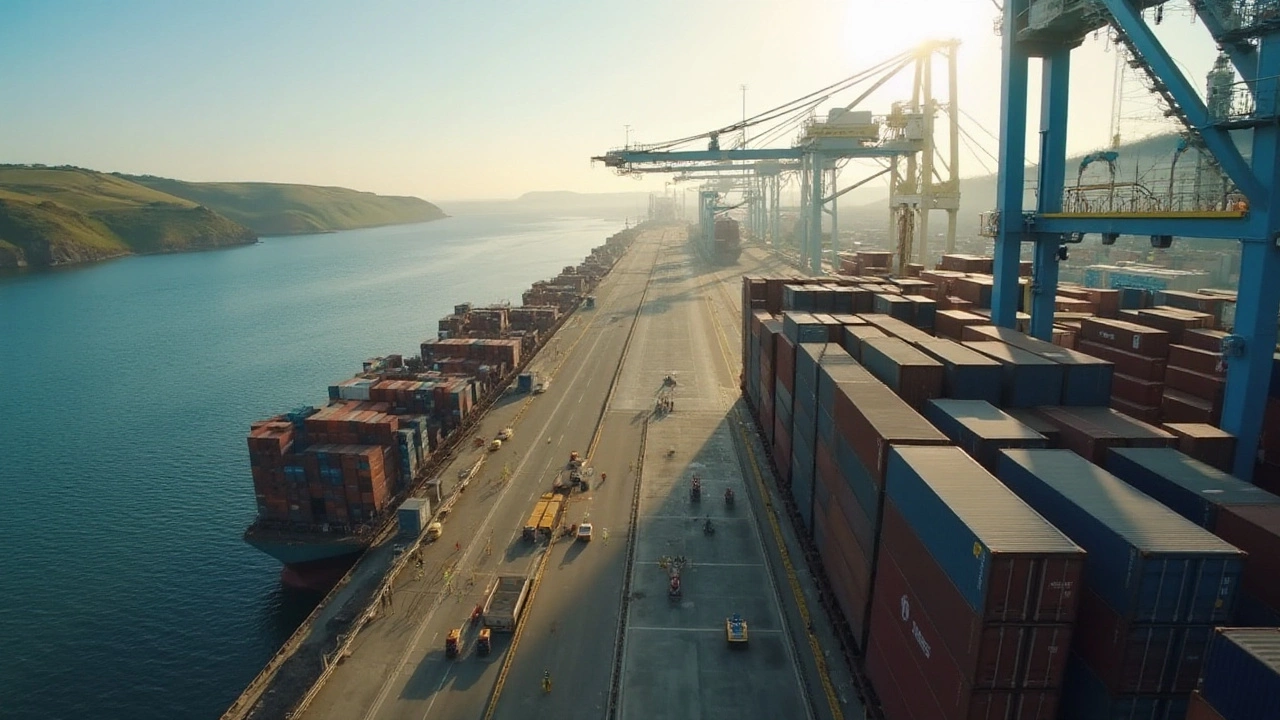The world of logistics is a fascinating one, often hidden in plain sight. It is a vital cog in the intricate machinery of global commerce, yet many people have only a vague understanding of what it entails. Behind the seamless movement of goods lies a dedicated workforce that orchestrates every step with precision and expertise.
In logistics companies, professionals dive into the nitty-gritty of supply chain management, transportation, warehousing, and distribution. These roles are not just about moving things from point A to point B—they're about optimizing processes, ensuring quality, and adapting to the ever-evolving challenges of the industry. As you delve into the logistics profession, you'll find a world driven by strategy, skill, and a keen understanding of the global marketplace.
- The Role of Logistics Professionals
- Skills Required in Logistics
- Career Pathways in Logistics Industry
- Impact of Technology on Logistics Roles
- Real-Life Stories and Insights
The Role of Logistics Professionals
Logistics professionals are the unsung heroes of the supply chain, ensuring that goods move smoothly and efficiently from manufacturers to consumers. Their role involves a complex blend of coordination, management, and strategic planning, making sure each step in the logistics process functions seamlessly. These individuals are responsible for various key activities, such as inventory control, transport coordination, and warehouse management. What makes their work all the more challenging yet fulfilling is the responsibility to enhance operational efficiencies while minimizing costs. In doing so, logistics experts directly contribute to the profitability and sustainability of businesses.
One of the primary duties of logistics professionals is to manage the flow of products in a cost-effective manner. This involves not just moving items efficiently, but also selecting the best modes of transportation, be it road, rail, air, or sea. Their keen understanding of transportation dynamics helps mitigate transit delays and ensures timely deliveries. Moreover, they have to establish strong relationships with suppliers, carriers, and distributors, building a network of reliable partners who can be called upon to meet urgent demands or tackle emerging challenges in the supply chain.
Another fundamental aspect of logistics work is inventory management. Ensuring just the right amount of stock is available at the right time is a critical task that keeps businesses running smoothly. Logistics professionals employ advanced technologies and software to track inventory levels, forecast demand, and make data-driven decisions. This proactive approach minimizes overstock and stockouts, ultimately safeguarding business interests. Their analytical skills are crucial for examining market trends, customer preferences, and seasonal fluctuations, enabling companies to adapt quickly to shifts in demand.
The logistics field is not just about numbers and scheduling; it involves a significant amount of creative problem-solving. Coping with disruptions like weather delays, supplier issues, or unforeseen economic conditions requires agility and quick thinking. Logistics managers often have to find innovative solutions on the fly to prevent setbacks from cascading into larger issues. This readiness for unexpected challenges makes them invaluable to companies that need resilient operations to stay competitive in today's fast-paced market.
In a world increasingly shaped by technology, logistics professionals are also at the forefront of embracing innovations to enhance their operations. From leveraging artificial intelligence to optimize delivery routes to using blockchain for secure and transparent transactions, they are consistently exploring new tools that can offer a competitive edge. As a result, tech-savvy individuals finding their niche in logistics can expect to operate in a dynamic environment where continuous learning and adaptation are essential qualities.
"Logistics is the backbone of global trade, a field where precision, efficiency, and technology come together to keep the world moving." - John Smith, Logistics Expert
Skills Required in Logistics
In the bustling world of logistics, possessing a specific set of skills is paramount to ensuring that everything falls into place smoothly. To thrive in this sector, one must first hone their communication skills. Whether you're negotiating contracts, coordinating with team members, or discussing delivery terms with suppliers, conveying information clearly and effectively is crucial. But that's not all—problem-solving abilities also form a cornerstone of logistics expertise. Daily challenges often demand creative solutions, and professionals must think on their feet to tackle issues like unexpected delays or inventory discrepancies.
Coupled with communication and problem-solving, a sharp eye for detail is indispensable. With thousands of items perhaps flowing through a warehouse at any given moment, accuracy in documentation and data management becomes critical. Many logistics roles require meticulous tracking of shipments and inventory levels which, if mishandled, could lead to significant operational hiccups. Here, being detail-oriented is more than a skill—it's a necessity. To put it in context, a significant misstep can snowball into costly mistakes, severely impeding the logistics companies involved.
Let’s not forget the growing importance of technical skills in this digital age. Technology is making waves in the logistics landscape with software and tools that help streamline operations. Whether it's learning to navigate the latest inventory management software or using data analytics tools to forecast demand, being tech-savvy is clearly an advantage. In some firms, the integration of AI has started transforming how logistics are managed, predicting stock requirements with uncanny precision. A report from the World Economic Forum forecasts a surge of more than 30% in logistics companies adopting AI by 2030. Staying adaptable and open to learning new technologies is more than just wise; it is becoming essential.
"As logistics continues to evolve with technology," says John Smith, a notable industry expert, "embracing change is not just a strategy; it’s survival."
Additionally, the art of teamwork should be emphasized. Many facets of logistics depend on smooth collaboration between different departments. From procurement to warehouse operations, transportation, and customer service, each segment must operate in harmony. Working as part of a cohesive team not only facilitates better workflow but also enhances the decision-making process. It's often the collective effort that ensures a customer's order is efficiently fulfilled, and team-oriented individuals are highly valued in this sector. A 2022 study revealed that companies prioritizing teamwork in logistics reported a 15% increase in efficiency compared to those that did not.
Finally, let's talk about organizational skills and time management. Given that logistics is all about delivering the right product to the right place at the right time, having the ability to juggle numerous tasks without dropping the ball is invaluable. It requires a disciplined approach to schedule adherence, prioritizing tasks effectively, and sometimes, managing unforeseen disruptions that can mess with deadlines. To excel in logistics, one must master the ability to keep multiple plates spinning while remaining calm and collected under pressure. Much like a careful dance, logistics professionals must execute their roles with precision and unwavering focus, ensuring every package makes its way to its rightful destination with minimal delay.

Career Pathways in Logistics Industry
Entering the logistics industry opens doors to a multitude of exciting and diverse career paths. With the modern world heavily relying on the smooth transit of goods, the demand for skilled logistics professionals is ever-growing. An interesting aspect of pursuing a career in logistics is the variety it offers. Whether you are interested in the operational side or inclined towards strategic planning, there's a role that suits every kind of skill set within logistics companies. Careers in this field may range from logistics analysts who meticulously examine data to identify and enhance efficiency, to logistics managers who oversee teams ensuring everything works like a well-oiled machine. These positions require a sharp analytical mind and robust problem-solving skills as they handle unexpected hiccups that might occur along the supply chain.
The path within the logistics industry is not linear, which is one of its appealing aspects. Individuals can start in entry-level positions such as warehouse associates or logistics coordinators. These positions provide a holistic view of logistics operations, laying a solid foundation for advancement. As one gains experience, opportunities for roles like supply chain managers, purchasing managers, and distribution managers emerge. Each step upwards requires a deeper understanding of supply chain dynamics and improved leadership skills. The need for continuous learning and adaptation is constant, especially with evolving technologies reshaping the landscape.
"The logistics industry is a amalgamation of human creativity and technological innovation," says Thomas Pisello, Chief Evangelist at Mediafly, speaking about the symbiotic relationship between technology and logistics roles.
Interestingly, the sector is embracing technology at an unprecedented pace. The advent of AI and data analytics has birthed roles specifically designed to harness these innovations. Positions like logistics IT specialists and data scientists have become integral to devising smarter supply chain solutions. Practical knowledge of automation tools and proficiency in data interpretation can significantly boost one's career trajectory in this tech-savvy era. Moreover, with sustainability becoming a universal concern, logistics roles focused on green practices are also being carved out, appealing to individuals passionate about environmental preservation. The logistics field not only offers career stability but also opportunities for those who aspire to make a meaningful impact through sustainable business practices. The logistics landscape promises a vibrant and fulfilling career for those ready to embark on this journey.
Impact of Technology on Logistics Roles
The logistics industry, known for its complex networks and meticulous planning, is undergoing a transformation thanks to technological advancements. The integration of technology has reshaped logistics roles, introducing new job functions and evolving existing ones. This tech-driven revolution is anchored in innovations like automation, artificial intelligence, and the Internet of Things (IoT). Logistics companies are embracing these tools not just out of necessity, but as a strategic move to enhance efficiency, reduce costs, and improve customer satisfaction. As a result, logistics professionals are finding themselves in a rapidly changing environment where adapting to new tools is as crucial as traditional skills.
One notable change comes from the use of automation in warehouses and distribution centers. Robotics now handle tasks once performed by humans, such as sorting and packing goods. This shift means logistics managers and coordinators must now oversee automated systems, ensuring they operate smoothly and effectively. It opens avenues for new roles centered around the maintenance and optimization of these machines. Automation also allows for more precise inventory management, minimizing human error and maximizing space utilization. Thus, logistics roles have pivoted from manual labor to more strategic and supervisory functions.
"Technology is not just an enabler of logistics efficiency. It's transforming the very nature of logistics jobs by equipping professionals with new tools," says Tom Davenport, renowned author and analytics expert.
Artificial intelligence and machine learning are also making significant inroads in the logistics industry. These technologies facilitate data-driven decision-making, optimizing routes and reducing delivery times. With AI's ability to process vast amounts of data, logistics professionals can predict delivery windows more accurately and respond to disruptions swiftly. This reliance on data and machine learning has created new opportunities for data analysts within logistics companies, who are now critical players in strategizing and enhancing the supply chain's efficiency.
The IoT has introduced smart logistics, where interconnected devices provide real-time tracking and monitoring of goods in transit. Sensors and trackers relay information about a shipment's location, temperature, and condition, enabling logistics professionals to ensure timely and secure deliveries. This technological leap has created new roles in logistics requiring expertise in managing IoT tools and interpreting the data they generate. While technology demands a new set of skills, it equally complements existing ones such as problem-solving and critical thinking, reinforcing their importance in this tech-savvy landscape.
| Technology | Impact on Role |
|---|---|
| Robotics | Reduces manual labor, enhances oversight roles |
| Artificial Intelligence | Enables data-driven decisions, creates data analyst roles |
| IoT | Improves tracking/logistics, necessitates IoT expertise |
As technology continues to evolve, so will its influence on the logistics industry. Professionals within logistics companies need to be lifelong learners, consistently upgrading their skills to keep up with these innovations. Training programs and workshops focusing on emerging technologies have become vital parts of career development in logistics. As we look to the future, the symbiotic relationship between technology and logistics roles will only deepen, with both spectrums appearing more sophisticated and indispensable to one another. For those willing to embrace this change, the path ahead in the logistics field is promising and likely to lead to even greater advancements in how goods travel the world.

Real-Life Stories and Insights
In the bustling world of logistics, stories abound that highlight the ingenuity and resilience of those who work within it. Take Sarah Mitchell for instance—a seasoned logistics coordinator at a leading supply chain firm in the UK. Her journey in the logistics industry began over a decade ago, immediately after she graduated with a degree in supply chain management. Sarah’s day often starts before sunrise, and her role demands an intricate blend of planning and quick decision-making. Each day is filled with challenges ranging from sudden weather disruptions to delays at border controls. Yet, Sarah finds immense satisfaction in solving these puzzles, ensuring products reach their destinations without a hitch.
Sarah recalls a particularly daunting situation during the early months of 2020, as the pandemic wrought havoc across global supply chains. Amidst the confusion, her team faced the monumental task of rerouting shipments that were stranded at ports due to sudden lockdowns. Their swift adaptation and innovative problem-solving were crucial in keeping the flow of essential goods intact. Sarah's unwavering dedication highlights the critical role logistics professionals play in ensuring the continuity of daily life, even when the world is enveloped in crisis. As she puts it, "In logistics, every day brings a new challenge, and with it, new opportunities to innovate solutions."
Another inspiring story is that of James O'Connor, a warehouse manager working for one of the largest e-commerce companies in Europe. His role is to oversee the complex operations within a vast distribution hub located just outside of Manchester. James employs cutting-edge technology to optimize storage and retrieval processes, significantly reducing the time taken to dispatch orders. However, the job is not just about tech; it involves managing a diverse team and fostering collaboration to keep operations running smoothly. Under his leadership, the warehouse has set new standards in efficiency, adapting rapidly to seasonal peaks and market fluctuations.
To give a clearer picture of the industry's impact, here's a small data insight: According to the UK Warehouse Association, the supply chain sector has grown by approximately 10% over the last five years, contributing significantly to the economy. This growth underscores the critical importance of genuinely understanding and adapting to changing market dynamics. It's not just about moving goods; it's about doing so sustainably, efficiently, and in a manner that aligns with the broader goals of businesses and communities.
"In logistics, adaptation is survival—your ability to innovate and respond swiftly can make or break the entire supply chain," says Richard Hutson, a renowned logistics analyst. His insights resonate with many in the industry who view constant evolution as a hallmark of logistics success. With the rapid advent of technology, from AI-driven analytics to autonomous delivery systems, professionals like Sarah and James are at the forefront, ensuring these innovations translate into real-world efficacy.
The realm of logistics isn't just a career path; it's a dynamic field bustling with opportunities and challenges that require a keen mind and an even keener heart. Real-life experiences from industry veterans offer a glimpse into a world that's not only pivotal to global commerce but also ripe with stories of human perseverance and ingenuity.


